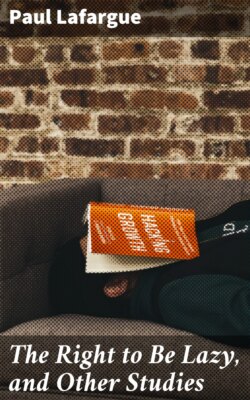The Right to Be Lazy, and Other Studies

Реклама. ООО «ЛитРес», ИНН: 7719571260.
Оглавление
Paul Lafargue. The Right to Be Lazy, and Other Studies
The Right to Be Lazy, and Other Studies
Table of Contents
THE RIGHT TO BE LAZY
I. A DISASTROUS DOGMA
FOOTNOTES:
II. BLESSINGS OF WORK
FOOTNOTES:
III. THE CONSEQUENCES OF OVER-PRODUCTION
FOOTNOTES:
IV. NEW SONGS TO NEW MUSIC
FOOTNOTES:
APPENDIX
FOOTNOTES:
SOCIALISM AND THE INTELLECTUALS
FOOTNOTES:
THE BANKRUPTCY OF CAPITALISM
FOOTNOTE:
THE WOMAN QUESTION
II
III
IV
FOOTNOTES:
THE SOCIALIST IDEAL
THE RIGHTS OF THE HORSE AND THE RIGHTS OF MAN
Отрывок из книги
Paul Lafargue
Published by Good Press, 2019
.....
Instead of taking advantage of periods of crisis, for a general distribution of their products and a universal holiday, the laborers, perishing with hunger, go and beat their heads against the doors of the workshops. With pale faces, emaciated bodies, pitiful speeches they assail the manufacturers: "Good M. Chagot, sweet M. Schneider, give us work, it is not hunger, but the passion for work which torments us". And these wretches, who have scarcely the strength to stand upright, sell twelve and fourteen hours of work twice as cheap as when they had bread on the table. And the philanthropists of industry profit by their lockouts to manufacture at lower cost.
If industrial crises follow periods of over-work as inevitably as night follows day, bringing after them lockouts and poverty without end, they also lead to inevitable bankruptcy. So long as the manufacturer has credit he gives free rein to the rage for work. He borrows, and borrows again, to furnish raw material to his laborers, and goes on producing without considering that the market is becoming satiated and that if his goods don't happen to be sold, his notes will still come due. At his wits' end, he implores the banker, he throws himself at his feet, offering his blood, his honor. "A little gold will do my business better", answers the Rothschild. "You have 20,000 pairs of hose in your warehouse; they are worth 20c. I will take them at 4c." The banker gets possession of the goods and sells them at 6c or 8c, and pockets certain frisky dollars which owe nothing to anybody: but the manufacturer has stepped back for a better leap. At last the crash comes and the warehouses disgorge. Then so much merchandise is thrown out of the window that you cannot imagine how it came in by the door. Hundreds of millions are required to figure the value of the goods that are destroyed. In the last century they were burned or thrown into the water. [12]
.....